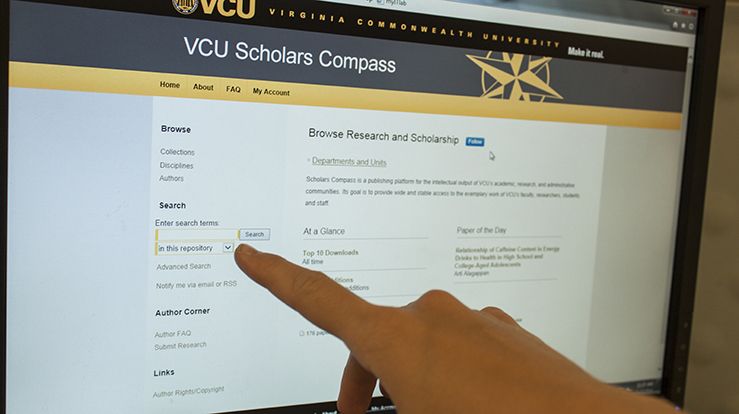Open-access publishing platform offers thousands of scholarly articles, research findings and data to the public for free.
September 19, 2014
VCU Libraries is introducing a digital publishing platform that is making thousands of scholarly articles, presentations, research findings and data produced at Virginia Commonwealth University available to the general public.
The open-access platform, called VCU Scholars Compass, will serve as VCU's repository for the intellectual output of the university's faculty, researchers, students and staff.
"This is a foundational, strategically important investment for this university and this library system," said University Librarian John Ulmschneider. "We absolutely have to build this in order to make sure that this maturing research university has the research library infrastructure to support it."
So far, upwards of 4,100 papers and other scholarly materials have been uploaded to Scholars Compass, and have already been downloaded nearly 23,000 times.
"We have a commitment to keeping these things for the long term – not just five years, but 50 years, 100 years," Ulmschneider said. "That's what we do. We are going to keep everything that our scholars publish for a long, long time so that scholars in the future can have access to them. That's part of our tradition."
In building its own publishing platform, VCU Libraries is embracing scholars' shift away from publishing their work in traditional peer-reviewed academic journals, which are often expensive and not easily accessible to the general public.
"Increasingly scholars are turning to open-access journals [and other platforms] because they are faster and they reach more people," Ulmschneider said. "So our job in the libraries is to enable that capability among our community at VCU."
For libraries, he said, there is also a growing need to reduce the amount of money spent on peer-reviewed journal subscriptions. VCU Libraries, for example, spends roughly $8 million per year on acquiring journal subscriptions and related materials.
"If you project ahead with the cost increases of scholarly journals, they can eat up the entire budget for this entire university in 20 years. That's not an exaggeration," Ulmschneider said. "On average, we're compounding the cost of scholarly journal subscriptions by about 5 percent to 7 percent a year. Do that for 20 years, and you're talking hundreds of millions of dollars."
As scholars continue to shift toward open-access platforms such as VCU Scholars Compass, the amount spent on journal subscriptions will eventually decrease.
At the same time, he added, peer-reviewed journals will continue to be important to the library.
"The importance of the peer-reviewed journals of the sort we buy today is extraordinarily high and has not diminished," Ulmschneider said. "These are journals with high prestige factors. But alternative means of scholarly expression are growing rapidly in both prestige and impact."
VCU Scholars Compass also will allow scholars to more easily make their research findings available to the public. Under a new federal law, which went into effect in January, the findings of roughly 60 percent of all federally funded research must be made publicly accessible within 12 months.
Sam Byrd, the digital collections systems librarian who is implementing VCU Scholars Compass, said the platform is in its early stages, but already features an array of open-access journal articles, conference presentations, unpublished papers, working papers and select chapters from published books.
"This is a place where people can be made aware of all the great research and scholarship that's coming out of VCU, and to have it all in one place," Byrd said.
Byrd said he hopes to see scholars across VCU embrace the platform.
"I would like to see cross representation of every school if not every department at VCU," he said. "I would like to see [scholars] take advantage of the fact that it's not just papers that they can post, it's also presentations from conferences that they've given, working papers, data they've got. The more of that we can get, the better."--by Brian McNeill, University Public Affairs
< Previous Next >
 Chat
Chat